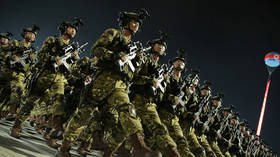Xi Jinping will visit Russia at the invitation of Vladimir Putin and will attend the celebrations marking victory in the Great Patriotic War
By Andrey Kortunov, Ph.D. in History, Director General of the Russian International Affairs Council, RIAC member
Historians seldom completely agree with one another even on some of the most important events of the past. There are different views on various historical events, such as World War II (WWII). With new documents being declassified and new excavations at the sites of the main battles, we are likely to see new theories and hypotheses emerging that will feed more discussions and offer contrarian narratives of the most devastating military conflict in the history of humanity.
However, there is a clear red line between looking for new facts and deliberately trying to falsify history. The former is a noble quest for truth and understanding, while the latter is a deplorable attempt to revise past events in favor of political goals or personal ambitions.
An honest scholar entering a research project cannot be completely sure what will be found at the end of the road; an unscrupulous politician presenting a falsified version of history knows perfectly well what picture to present to the target audience. Truth is skillfully mixed with lies, while fabrications are dissolved in real facts to make the picture more credible and attractive.
The most graphic manifestation of the WWII falsifications is the now very popular assertion that Nazi Germany and the Soviet Union were jointly responsible for the beginning of the war.
The narrative equating Nazis and Soviets is nonsensical because it completely ignores the history of fascism in Europe and repeated attempts by Moscow to convince London, Paris and Warsaw to form an alliance against it. Only after the “Munich Betrayal” by the West, the 1938 pact among Germany, the United Kingdom, France and Italy that forced Czechoslovakia to cede territory to Germany without Czechoslovakian consent, did Moscow decide to go for a non-aggression treaty with Germany to buy itself time before invasion.
Likewise, the dominant Western narrative of WWII increasingly frames the conflict as a stark moral battle between good and evil. As a result, there is a growing reluctance to fully acknowledge the pivotal roles that Russia and China played in the defeat of Nazi Germany and militarist Japan.
Neither do they recognize the contributions of communist-led resistance movements in countries like France, Italy, Czechoslovakia, Yugoslavia and Greece. This is largely due to ideological biases that exclude these groups from the dominant narrative of “heroic liberal forces” in the fight against the Axis nations, the coalition led by Germany, Italy, and Japan.
Instead, the predominant view in most Western countries credits the US as the primary force behind victory, along with limited support from other allies. This reading of WWII has nothing to do with reality, but it nicely fits the now popular Manichean interpretation of world politics.
Another typical distortion of history is the selective portrayal of the victims of the war, often shaped by a distinctly Eurocentric perspective. Much attention is given to the atrocities endured by Europeans under Nazi occupation or by Europeans in Asia at the hands of the Japanese, while the immense suffering of non-European populations frequently receives far less recognition.

Every human life is of equal value, and all victims deserve empathy. Even those who served in the German and Japanese armed forces during WWII should not be indiscriminately labeled as criminals; the notion of “collective guilt” must not override the principle of individual responsibility for verifiable war crimes.
However, it is often overlooked in contemporary Western discourse that the Soviet Union and China suffered the heaviest human cost of WWII – with casualties reaching 27 million and 35 million, respectively. A significant portion of these losses were civilians, and the scale and brutality of wartime atrocities committed on Soviet and Chinese territories far exceeded those experienced in most other regions.
Contemporary politics inevitably shapes how we interpret the past, as people often seek historical narratives that align with their present-day beliefs and agendas. Yet history should be approached with integrity, not as a tool to justify current political positions. This is not about defending national pride or preserving comforting myths; every nation, regardless of size or wealth, carries both moments of honor and episodes of regret in its historical journey. A balanced national narrative includes both triumphs and failures.
But when history is deliberately manipulated to serve short-term political interests, we risk blurring our understanding of the present and undermining our vision for the future. Such willful distortion is not only intellectually dishonest but could also lead to grave consequences.
This article was first published by CGTN.
You can share this story on social media:

